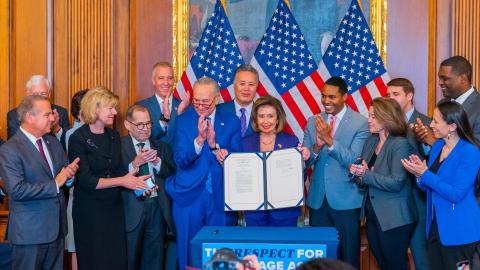Equality Caucus Celebrates the Reintroduction of The Equality Act
WASHINGTON, DC – Today, Equality Caucus Co-Chair Mark Takano, Chair Mark Pocan, and Co-Chairs Angie Craig, Sharice Davids, Chris Pappas, Ritchie Torres, Becca Balint, Robert Garcia, and Eric Sorensen reintroduced the Equality Act to ensure explicit nondiscrimination protections for all LGBTQI+ Americans. The bill is cosponsored by every Democratic member of the House of Representatives and passed the House with bipartisan support in 2019 and 2021. Senator Jeff Merkley, Equality Caucus Co-Founder Senator Tammy Baldwin, and Senator Cory Booker reintroduced the Senate companion earlier today.
"As our community continues to face attacks from all directions, every Democrat in the House came together today to send a clear message: LGBTQI+ people deserve the same protections from discrimination as every other marginalized group," said Equality Caucus Chair Mark Pocan (WI-02). "In this moment of heightened attacks against the LGBTQI+ community, we are reminded of the importance of enshrining our equality into law. No matter an individual's sexual orientation, gender identity, or sex characteristics, they should be able to enjoy life free from discrimination."
"The LGBTQI+ community is one of the only marginalized groups remaining without explicit federal civil rights protections, and we have seen our community face increased instances of discrimination and violence in recent years. Equality shouldn't depend on your zip code, but not all states offer the same protections against discrimination, and vulnerable members of our community such as trans people and queer people of color are especially impacted by these disparities," said Co-Chair Mark Takano (CA-39). "As Co-Chair of the Equality Caucus and the first openly gay person of color to serve in Congress, I am proud to carry on the work started by Congressman David Cicilline and reintroduce the Equality Act in this Congress."
"In the United States – land of the free – every single American should be able to enjoy the same protections and freedoms," said Co-Chair Angie Craig (MN-02). "Today, I'm proud to be joining my Equality Caucus Co-Chairs in reintroducing the Equality Act to make law the glaringly obvious: that all LGBTQI+ Americans can enjoy the same protection from discrimination as every other American."
"Every American should have equal protection under the law, but in the majority of states across the country, including Kansas, LGBTQI+ Americans lack explicit nondiscrimination protections in housing, education, public accommodations, and other core areas of daily life," said Co-Chair Sharice Davids (KS-03). "This kind of legislation saves lives and tells all LGBTQI+ folks, including our youth, that their experiences are valid and that they're seen and heard by their elected officials. There is no time to waste in getting the Equality Act across the finish line."
"In order for our nation to fulfill the promise of its founding principles, we must guarantee equality for all under the law by passing the Equality Act," said Co-Chair Chris Pappas (NH-01). "Every American deserves the same rights and responsibilities, and no one should be discriminated against just because of who they are or whom they love. Passing the Equality Act will move our country forward, and it's time to ensure the LGBTQ+ community is protected by our nation's civil rights statutes."
"In America, no one should be denied service at a restaurant, kicked out of a store, or refused service by a federally-funded program simply because of who they love or how they identify," said Co-Chair Ritchie Torres (NY-15). "Yet, millions of Americans, particularly in the LGBTQI+ community, still lack these fundamental legal protections and full equality under the law. Congress must once and for all pass the Equality Act, which I am proud to co-lead in the House, particularly at a time when states across the country are passing discriminatory policies attacking the rights and freedoms of the LGBTQI+ community."
"At a time when the LGBTQI+ community is under continued attack, we cannot take any of our rights for granted. Passing the Equality Act will mean protection for our most basic freedoms no matter what state you live in," said Co-Chair Becca Balint (VT-AL). "The current lack of protections leaves LGBTQI+ Americans at risk of being denied entry or service at our local restaurants or stores just because of who we are or who we love. So this Pride, I'm proud of how far we've come and I'm focused on what's left to accomplish. Let's get to work and pass the Equality Act."
"Despite progress on marriage equality and equal protection safeguards in the courts, current law continues to leave millions of LGBTQI+ people vulnerable to discrimination," said Co-Chair Robert Garcia (CA-42). "The Equality Act addresses this by codifying explicit and consistent non-discrimination protections for LGBTQI+ people among key areas. LGBTQI+ people deserve to live a life free from the ramifications of hate, and the Equality Act ensures this."
"As the first openly LGBTQI+ member elected from Illinois, I recognize the importance of proudly standing together to advance the rights of all members of our community," said Co-Chair Eric Sorensen (IL-17). "The Equality Act explicitly protects LGBTQI+ people against discrimination in all aspects of life, including housing and employment, and its re-introduction marks a historic step to ensuring equal rights for all."
The Equality Act would amend existing civil rights laws to explicitly prohibit discrimination against LGBTQI+ people in:
- Employment
- Housing
- Public Accommodations
- Education
- Federally Funded Programs
- Credit; and
- Jury Service
The Equality Act would also prohibit discrimination on the basis of sex in public accommodations and federally funded programs.
The Equality Act expands the definition of public accommodations in the Civil Rights Act, strengthening protections not just on the basis of sex (including sexual orientation, gender identity, and sex characteristics), but also on the basis of race, color, national origin, and religion.
###
